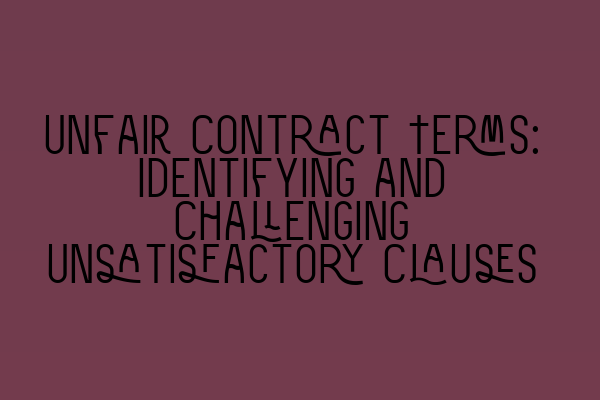Unfair Contract Terms: Identifying and Challenging Unsatisfactory Clauses
Contracts play a vital role in the legal framework of business transactions and personal agreements. They outline the rights and responsibilities of each party involved, providing a sense of security and clarity. However, not all contract terms are fair and transparent. Some clauses may be deemed unfair, giving one party an unfair advantage over the other.
Understanding Unfair Contract Terms
An unfair contract term refers to a provision that puts one party at a disadvantage, contrary to good faith and fair dealing. These clauses are often hidden in the fine print, making them easy to miss or overlook. They may give the other party excessive power, limit liability, or unreasonably restrict the rights of one party.
It’s important for individuals and businesses to be aware of unfair contract terms and know how to identify and challenge them. Here are some key steps to take:
Step 1: Familiarize Yourself with Relevant Legislation
The first step in identifying unfair contract terms is to understand the legal framework surrounding contract law. In the UK, the Unfair Contract Terms Act 1977 and the Consumer Rights Act 2015 provide guidance on what constitutes an unfair provision.
Familiarize yourself with these Acts and keep them on hand for reference when reviewing contracts. Understanding the legislation will assist you in identifying potential unfair terms and mounting a strong challenge against them.
Step 2: Perform a Thorough Contract Review
When presented with a contract, it’s crucial to conduct a comprehensive review to identify any unfair terms. Take note of clauses that could give one party an unfair advantage, such as excessively limiting liability or placing a disproportionate burden on the other party.
Avoid rushing through the review process and seek professional legal advice if needed. Solicitors who specialize in contract law can provide valuable insights and help you navigate complex contractual language.
Step 3: Analyze the Contractual Relationship
Consider the nature of the contractual relationship and whether it involves a business-to-business or business-to-consumer transaction. Different legal protections may apply depending on the context.
For business-to-consumer contracts, the Consumer Rights Act 2015 offers additional safeguards against unfair contract terms. The Act includes a ‘fairness test,’ which allows consumers to challenge terms that are found to be unfair or unclear.
On the other hand, business-to-business contracts may be subject to a more stringent ‘reasonableness test.’ This test examines whether the party seeking to rely on the term acted reasonably when including it in the contract.
Step 4: Challenge the Unfair Contract Terms
If you identify a potentially unfair contract term, you have the right to challenge it and seek redress. The process for challenging unfair terms may vary depending on the circumstances, but here are some common avenues to consider:
- Request a renegotiation of the contract with the party who included the unfair term. Highlight the specific provision and explain your concerns.
- If negotiation fails, consider mediation or alternative dispute resolution methods to resolve the dispute amicably.
- If all else fails, consult with a solicitor who specializes in contract law. They can provide expert guidance on the best course of action, which may include pursuing legal remedies through litigation or arbitration.
Stay Informed and Protect Your Interests
Understanding unfair contract terms and how to identify and challenge them is crucial to protecting your interests. By familiarizing yourself with relevant legislation, conducting thorough contract reviews, and seeking legal advice when needed, you can ensure that your rights are upheld in any contractual relationship.
At SQE Contract Law, we offer comprehensive courses and resources to equip aspiring solicitors with the knowledge and skills needed to tackle complex legal issues, including unfair contract terms. Check out our SQE 1 Practice Exam Questions and SQE 1 Practice Mocks FLK1 FLK2 for interactive practice, and explore our SQE 2 Preparation Courses and SQE 1 Preparation Courses to enhance your legal knowledge.
Stay updated on the latest SRA SQE exam dates and ensure you are well-prepared for success in your legal career. Learn more about upcoming examination schedules here.
Remember, knowledge is power when it comes to identifying and challenging unfair contract terms. Arm yourself with the necessary skills to protect your interests and promote fairness in contractual relationships.
